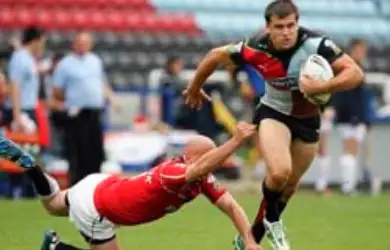London Calling

The Rugby Football League has never been shy about offering support to Super League’s representatives in London, whether under previous guises or in their current incarnation as Harlequins. It’s not then that much of a surprise to hear Richard Lewis last week offering assurances that the Londoners’ bid for a Super League license won’t be judged solely on their attendances – or lack of them.
Attendances have always been a problem in the capital, and this season Quins have attracted on average fewer than 2,500 spectators to their Twickenham Stoop home.
For clubs in the heartlands this would undoubtedly lead to talk of being ejected from the top flight, but as Lewis told BBC London “The growth of London rugby league isn’t being reflected necessarily in the number of spectators going to Harlequins. People look at the crowd figures [and] think it reflects other aspects of the club but that wouldn’t be fair.” Lewis’ comments aren’t incorrect, but it does look as though the RFL is doing all it can to see the bright side of Quins’ application and overlook any deficiencies.
Why does so much effort go into maintaining a Super League club in London, when an M62 corridor club in a similar situation may be ushered towards the Super League trap door? The answer, say supporters of Quins’ continued top-flight presence, is that having a London presence allows the competition to get more money in sponsorship and TV rights. For example, it’s often asserted that BSkyB would drastically reduce the amount they pay for the right to broadcast Super League without expansion teams in general and Harlequins in particular.
Today it was announced that engage Mutual Assurance will not be continuing their sponsorship of Super League from next season, and the argument goes that the existence of Harlequins as Super League’s London outpost will allow the RFL to get more money from sponsorship than they would otherwise.
Some people would dispute that claim – after all, Sky are nowhere on record as saying they would reduce the amount of money given to a London-less Super League – but it is probably true. This explains Lewis’ wish for a second London franchise: having two London teams, complete with a rivalry and twice-yearly derbies, could increase money-making opportunities still further. Yet despite this the RFL’s stance does seem rather unfair. Clubs like Harlequins and the Wrexham-based Crusaders do get preferential treatment in a way that rankles with many of the game’s supporters.
As an example, the received wisdom is that financial troubles will see Wakefield Trinity plying their trade in the Co-operative Championship from 2012 onwards, whereas the self-same financial troubles will have virtually no consequences for the Crusaders. Or, more pertinently for this discussion, Harlequins could receive a Super League license while their average attendance dips below the minimum level required for Championship clubs to be allowed even to submit an application.
Are Quins really more deserving of a place in Super League than Barrow, Featherstone, Halifax or Leigh? That’s a question that will elicit not an answer but rather screams of anguish from the most ardent of expansionists. It’s not a question to which I have an answer. There’s no easy solution to this. The problem, in sum, is that Quins may well advantages for Super League as a competition that clubs in other areas cannot match, no matter how well they perform.
This debate isn’t going to go away any time soon. I suppose your opinion depends a great deal on whether you see rugby league primarily as a sport or primarily as a business.
Keep Your Eye on Rugby League